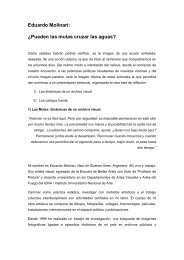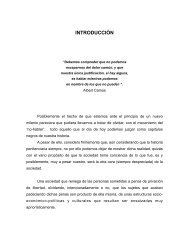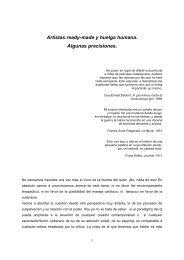Alice Creischer and Andreas Siekmann Universalism in Art and the ...
Alice Creischer and Andreas Siekmann Universalism in Art and the ...
Alice Creischer and Andreas Siekmann Universalism in Art and the ...
Create successful ePaper yourself
Turn your PDF publications into a flip-book with our unique Google optimized e-Paper software.
<strong>in</strong>dividual fate,18 <strong>in</strong> order to emphatically fixate <strong>the</strong> attention of <strong>the</strong> readers, who identify<br />
wholly with <strong>the</strong> system perpetuat<strong>in</strong>g <strong>the</strong> situation, on that lone <strong>in</strong>dividual.<br />
One last example: <strong>in</strong> <strong>the</strong> film »A Bird’s Nest for <strong>the</strong> People,« Christoph Schaub <strong>and</strong> Michael<br />
Sch<strong>in</strong>dhelm, Director of <strong>the</strong> Dubai Culture <strong>and</strong> <strong>Art</strong>s Authority s<strong>in</strong>ce March 2008, <strong>in</strong>terview <strong>the</strong><br />
architects Herzog <strong>and</strong> de Meuron about <strong>the</strong> construction of <strong>the</strong> stadium <strong>in</strong> Pek<strong>in</strong>g. They<br />
discuss to what extent it is justifiable to »build <strong>in</strong> an undemocratic country like Ch<strong>in</strong>a that<br />
ignores human rights … The work<strong>in</strong>g conditions on <strong>the</strong> construction site are not a topic at<br />
all.«19 It is easy to <strong>in</strong>terpret this bl<strong>in</strong>d spot as mere self-censure <strong>in</strong> <strong>the</strong> name of <strong>the</strong> client. It<br />
seems to be a task of idealistic art to ease <strong>the</strong> <strong>in</strong>soluble conflict between be<strong>in</strong>g <strong>in</strong>volved <strong>in</strong> an<br />
outrageous societal reality <strong>and</strong> a universal participation <strong>in</strong> Be<strong>in</strong>g. This is exactly <strong>the</strong> po<strong>in</strong>t<br />
where it puts a big bl<strong>in</strong>d spot <strong>in</strong> <strong>the</strong> eye by creat<strong>in</strong>g generally accepted images: a camel <strong>in</strong> a<br />
suitcase, <strong>the</strong> dream of America, a personal code of conduct, <strong>the</strong> beautiful drama of an<br />
exemplary fate. This universality preemptively clogs <strong>the</strong> channels of criticism with mean<strong>in</strong>g,<br />
with a pre-stabiliz<strong>in</strong>g harmony <strong>in</strong> order to prevent <strong>the</strong> divisiveness that criticism produces, to<br />
h<strong>in</strong>der our own aloneness <strong>and</strong> its irreconcilability. This universality opposes <strong>the</strong> universality<br />
that dem<strong>and</strong>s rights, because it cannot allow negativity <strong>in</strong> a world that is everyth<strong>in</strong>g, which it<br />
<strong>in</strong> fact is.<br />
In an article about <strong>the</strong> history of slavery, Ala<strong>in</strong> Gresh recounts <strong>the</strong> voyage of <strong>the</strong> ship Comte<br />
d’Herouville <strong>in</strong> 1766, where Voltaire’s drama »Alzire or The Americans« was performed on<br />
deck. The fate of <strong>the</strong> Inca pr<strong>in</strong>cess Alzire touches <strong>the</strong> audience as a moral call to free <strong>the</strong><br />
Indians from Spanish bondage, while <strong>in</strong> <strong>the</strong> hold <strong>the</strong> African slaves lie penned up.20 This<br />
rem<strong>in</strong>ds us of <strong>the</strong> story about Gericault’s »Raft of <strong>the</strong> Medusa« <strong>and</strong> Delacroix’s »Freedom on<br />
<strong>the</strong> Barricades«, which Peter Weiss believes demonstrate <strong>the</strong> difference between operative<br />
<strong>and</strong> idealist aes<strong>the</strong>tics. It likewise recalls an entire tradition of Marxist <strong>the</strong>ory of art <strong>and</strong><br />
literature that transferred <strong>the</strong> criticism of <strong>the</strong> categories of bourgeois thought to <strong>the</strong> art<br />
production that was en vogue at <strong>the</strong> time 21 <strong>and</strong> whose avant-garde visions would look so<br />
foolish from <strong>the</strong> h<strong>in</strong>dsight of history.<br />
But we are confronted with societal contexts that are <strong>in</strong> need of careful description <strong>and</strong><br />
analysis <strong>in</strong> order to underst<strong>and</strong> <strong>the</strong>m at all <strong>in</strong>tellectually <strong>and</strong> emotionally. We can remember<br />
that <strong>in</strong> <strong>the</strong>se embarrass<strong>in</strong>g <strong>the</strong>ories lie analytical tools that rema<strong>in</strong> applicable <strong>and</strong> necessary.<br />
Marxist criticism of fetishism – <strong>the</strong> objectification of social relations – has rightly been applied<br />
to <strong>the</strong> history of leftist <strong>the</strong>ory <strong>and</strong> its political epistemology.22 We have <strong>the</strong> impression that<br />
this process of turn<strong>in</strong>g <strong>the</strong>ir own discussions <strong>in</strong>to a fetish is not a specific mark of an explicitly<br />
leftist <strong>the</strong>ory debate, but that this harden<strong>in</strong>g <strong>in</strong>to clusters of argumentation is also happen<strong>in</strong>g






